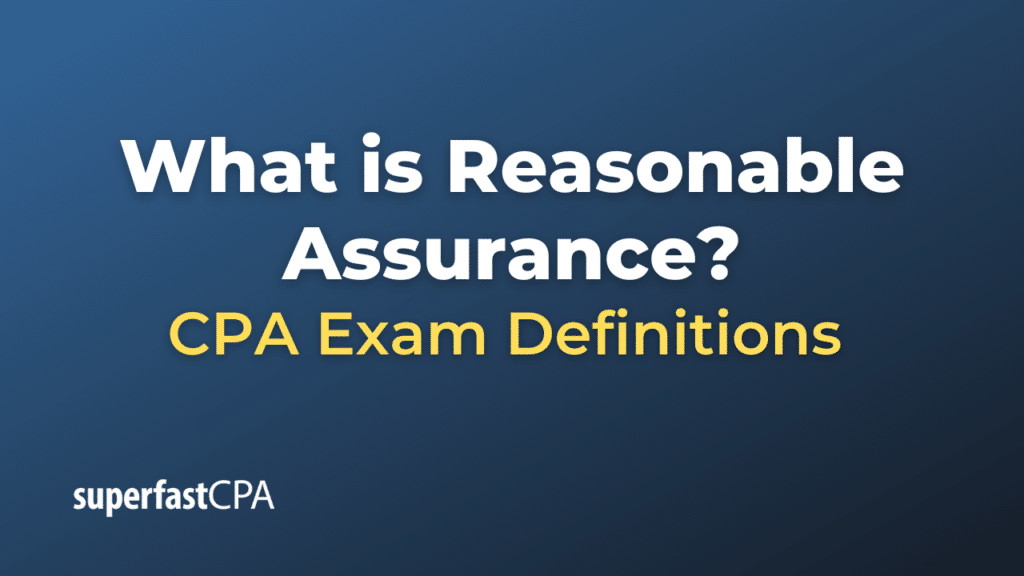Reasonable Assurance
“Reasonable assurance” is a term commonly used in the context of auditing and assurance services. It refers to a high, but not absolute, level of assurance that an auditor provides when they state that the financial statements are free from material misstatement.
Reasonable assurance is the primary level of assurance provided by auditors when they conduct an external audit of an organization’s financial statements. It is not an absolute assurance due to the inherent limitations of an audit, such as:
- Nature of Financial Reporting: The use of estimates and judgment by management in the financial statements can lead to uncertainties.
- Nature of Audit Procedures: Audits involve sampling, which means that not every transaction is reviewed. There’s always a risk that an error or fraud may not be detected if it’s not included in the sample.
- Limitations of Internal Control: No system of internal controls, no matter how well designed and implemented, can guarantee the prevention or detection of all misstatements.
- Time and Cost Constraints: It’s impractical to examine every single detail due to time and budget constraints.
- Risk of Fraud: Deliberate attempts to conceal fraud, especially involving collusion, can be difficult to detect.
Because of these and other limitations, there’s always a slight risk that a material misstatement might not be detected, even though the audit is properly planned and performed in accordance with generally accepted auditing standards.
In summary, while “reasonable assurance” implies a high degree of confidence, it does not guarantee that an audit will detect all material misstatements. When auditors provide an “unqualified” or “clean” opinion on financial statements, it is based on this level of assurance.
Example of Reasonable Assurance
Let’s use an example from the context of an external audit of a company’s financial statements.
Scenario: XYZ Corporation operates in the retail industry and has stores across the country. At the end of its fiscal year, XYZ Corporation engages the auditing firm “AuditPro LLP” to conduct an external audit of its financial statements.
Audit Process:
- Planning: AuditPro LLP begins by understanding XYZ Corporation’s business model, industry risks, internal control environment, and previous financial issues, if any.
- Sampling: Due to the vast number of transactions (sales, purchases, payroll, etc.) throughout the year, it’s impractical for AuditPro LLP to examine every single one. Instead, they select a sample of transactions from different periods and various locations for detailed testing.
- Testing: AuditPro LLP reviews the sampled transactions, ensuring they are recorded accurately, have appropriate documentation, and are in line with accounting standards.
- Findings: During their testing, the auditors identify a minor discrepancy in one store’s inventory count but determine it’s not material (i.e., not large enough to mislead a user of the financial statements).
- Communication: AuditPro LLP discusses the discrepancy with XYZ’s management, who provide a valid explanation and rectify the error in the final financial statements.
- Audit Opinion: Given the results of their testing and the immaterial nature of the discrepancy found, AuditPro LLP concludes that the financial statements present a fair view of XYZ Corporation’s financial position and results. They issue an “unqualified” or “clean” audit opinion.
However, this does not mean the financial statements are perfect or that AuditPro LLP checked every single transaction. It means that based on their testing and professional judgment, there’s reasonable assurance that the financial statements are free from material misstatement.
In Essence: If a stakeholder, like an investor, were to ask AuditPro LLP, “Are these financial statements error-free?” the auditors would explain that while they have a high level of confidence (reasonable assurance) in the accuracy of the financial statements, the inherent nature of an audit does not allow for absolute certainty. They have done their due diligence to ensure that any discrepancies are not large enough to mislead someone using the financial statements.













